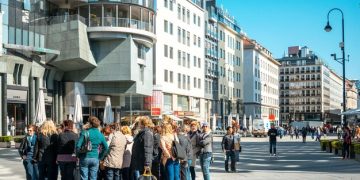Digital Nomad’s US Guide 2025: Top Wi-Fi, Coworking Cities

Navigating the United States as a digital nomad requires identifying cities that excel in providing reliable internet, productive coworking environments, and a supportive community, ensuring remote work is both efficient and enjoyable in 2025.
Embarking on a journey as a digital nomad’s guide to the US: top destinations with reliable high-speed Wi-Fi and co-working spaces in 2025 can be an exhilarating prospect, offering unparalleled freedom and flexibility. The United States, with its diverse landscapes and vibrant urban centers, presents a compelling canvas for remote professionals seeking the ideal blend of productivity and adventure. Finding the right city means more than just a place to stay; it means finding a place where your work seamlessly connects with your lifestyle.
Understanding the Digital Nomad Landscape in the US
The rise of remote work has fundamentally reshaped professional life, fostering a new generation of digital nomads who prioritize flexibility and geographical independence. In the United States, this trend has led to the emergence of cities that are particularly well-suited to support this lifestyle. These urban hubs not only offer robust infrastructure in terms of internet connectivity and dedicated workspaces but also cultivate communities that cater to remote professionals.
Choosing a base as a digital nomad involves a meticulous assessment of various factors beyond mere aesthetics. While a city might boast beautiful scenery or exciting nightlife, its true value to a remote worker hinges on its practical offerings. This includes everything from the stability and speed of internet services to the availability and quality of coworking spaces, alongside the cost of living and the presence of a supportive network of like-minded individuals. The right balance of these elements can significantly impact both productivity and overall well-being.
The Crucial Role of Connectivity
For any digital nomad, internet reliability is the cornerstone of their professional existence. Without consistent, high-speed Wi-Fi, even the most picturesque location becomes an impediment to work. Cities that invest heavily in fiber optic networks and have a high density of public Wi-Fi hotspots and cafes are inherently more attractive. These infrastructure advantages ensure that video calls remain uninterrupted, large files transfer smoothly, and online collaboration tools perform optimally, regardless of where one chooses to work.
- Fiber Optic Coverage: Look for cities with widespread fiber internet, offering symmetrical upload and download speeds.
- Public Wi-Fi Density: Assess the availability of free, reliable Wi-Fi in public parks, libraries, and cafes.
- Mobile Data Strength: Consider strong 5G coverage for backup and on-the-go connectivity.
The Appeal of Coworking Spaces
While working from home or a coffee shop might suffice for some, coworking spaces offer a unique blend of professionalism and community that many digital nomads seek. These shared environments provide dedicated ergonomic setups, meeting rooms, and amenities not typically found in a home office. More importantly, they foster a sense of belonging and provide opportunities for networking, collaboration, and learning from peers. The quality and variety of coworking options can be a strong indicator of a city’s commitment to supporting the remote workforce.
When evaluating coworking spaces, factors such as pricing structures, accessibility (24/7 access, public transport proximity), and the specific amenities offered (e.g., soundproof booths, complimentary coffee, community events) become important considerations. A vibrant coworking scene often correlates with a thriving entrepreneurial ecosystem, which can be invaluable for nomads looking to grow their skills or even launch new ventures. The evolving nature of these spaces in 2025 emphasizes flexibility, with many offering day passes, flexible memberships, and a range of private office options.
The strategic selection of a city, therefore, goes beyond personal preferences, delving into the practicalities of a work-from-anywhere lifestyle. It requires a discerning eye for the subtle yet significant details that collectively define a truly digital nomad-friendly destination in the US. This foundational understanding sets the stage for exploring specific cities that exemplify these qualities.
Austin, Texas: The Lone Star Tech Hub
Austin has cemented its reputation as a burgeoning tech hub, drawing in an increasing number of digital nomads and remote workers. Its appeal lies in a dynamic combination of innovative industries, a vibrant cultural scene, and a strong infrastructure that supports a mobile workforce. The city’s “Keep Austin Weird” ethos is reflected in its diverse population and a general openness to new ideas and lifestyles, making it an inviting place for those who defy traditional office norms.
The rapid growth of tech companies in Austin has naturally led to significant investment in high-speed internet infrastructure. Fiber optic networks are prevalent, offering reliable and fast connections crucial for anyone whose livelihood depends on online presence. This widespread connectivity ensures that digital nomads can work efficiently from various locations, be it a quiet coffee shop, a bustling communal area, or their own rented accommodation.
Coworking and Community in Austin
Austin boasts a robust ecosystem of coworking spaces, ranging from large, established networks to smaller, niche-specific hubs. These spaces are strategically located across the city, providing flexible options for different needs and budgets. They often host networking events, workshops, and social gatherings, fostering a strong sense of community among members.
- Capital Factory: Known for its startup focus and extensive mentor network, ideal for entrepreneurs.
- WeWork: Multiple locations offering diverse workspace options, popular among various professionals.
- Impact Hub Austin: A community-driven space focused on social innovation and collaboration.
Beyond the formal coworking spaces, Austin’s numerous coffee shops, libraries, and public parks often offer reliable Wi-Fi, providing alternative work environments. The city’s thriving music and arts scene, combined with its outdoor recreational opportunities along Lady Bird Lake, contribute to a high quality of life that complements the demanding nature of remote work.
While Austin’s popularity has led to an increase in the cost of living, it remains relatively more affordable than coastal tech giants. The city’s commitment to fostering innovation and supporting remote work makes it a top contender for digital nomads seeking a blend of professional opportunity and vibrant culture in 2025. This balance ensures that both work and leisure are equally accessible and enjoyable.

Denver, Colorado: Mountainous Connectivity
Denver, nestled at the foot of the Rocky Mountains, offers an enticing proposition for digital nomads: a thriving urban environment combined with unparalleled access to outdoor adventure. The city has steadily grown into a significant economic hub, particularly in technology, aerospace, and outdoor industries, which in turn has attracted a diverse array of professionals, including a growing number of remote workers. Its unique geographic location provides a distinct advantage, blending city life with natural escapes.
The connectivity in Denver is highly reliable, with extensive fiber optic networks ensuring high-speed internet throughout the metropolitan area. Major internet service providers have made substantial investments, recognizing the city’s growth and the increasing demand for robust online infrastructure. This makes working from anywhere in Denver a seamless experience, whether from a downtown apartment, a mountain-view cafe, or a dedicated coworking facility.
Work-Life Balance and Coworking in Denver
Denver’s culture strongly emphasizes an active, healthy lifestyle, which aligns perfectly with the flexibility often sought by digital nomads. The city’s coworking scene is as dynamic as its outdoor offerings, providing a variety of choices that cater to different work styles and preferences. These spaces often reflect the city’s ethos, blending professional amenities with a relaxed, approachable atmosphere.
- Galvanize: A popular choice for tech-focused individuals, offering coding bootcamps and a collaborative environment.
- Industrious: Premium spaces with a focus on hospitality and well-being, located in upscale areas.
- The Commons on Champa: A public-private partnership supporting entrepreneurs and startups, often with free events.
Beyond the specific coworking locations, Denver boasts numerous coffee shops and breweries that double as informal workspaces, many equipped with strong Wi-Fi. The city’s progressive attitude and a strong sense of community make it easier for newcomers to integrate and build social networks.
The cost of living in Denver, while rising, still offers a more balanced proposition compared to some coastal cities, especially considering the quality of life and access to nature. For digital nomads who value a high-tech environment combined with immediate access to hiking, skiing, and other outdoor pursuits, Denver stands out as an exceptional choice. The blend of robust internet, supportive workspaces, and a compelling lifestyle makes it a top destination for 2025.
Portland, Oregon: The Pacific Northwest Gem
Portland, Oregon, has long captivated those seeking an unconventional yet sophisticated urban experience. Known for its independent spirit, thriving arts scene, and commitment to environmental sustainability, it has organically attracted a large community of creatives, freelancers, and increasingly, digital nomads. The city’s unique charm lies in its harmonious blend of urban amenities with accessible natural beauty, from lush forests to the dramatic Oregon coast.
Connectivity in Portland is well-established, with a strong focus on providing reliable internet access. The city benefits from a competitive market among internet service providers, leading to good speeds and coverage across most neighborhoods. This ensures that digital nomads can maintain consistent productivity whether they choose to work from a cozy cafe, a bustling shared office, or their home base.
Coworking and the Portland Vibe
Portland’s coworking spaces often mirror the city’s quirky and collaborative ethos. They tend to be diverse, ranging from sleek, modern setups to more bohemian, artist-friendly environments, reflecting the varied professional landscape of the Pacific Northwest. These spaces are not just about desks and Wi-Fi; they are centers for networking, skill-sharing, and community building, often hosting events that foster connection among members.
- Hatch Innovation: Focuses on creativity and social good, often attracting non-profit and impact-driven ventures.
- Deskpass (various locations): Offers flexible access to multiple coworking spaces across the city with a single membership.
- NedSpace: Known for its vibrant community and support for startups and tech professionals.
The city’s extensive public transportation system, including light rail and a strong cycling culture, makes navigating Portland easy without a car, adding to its appeal for a transient lifestyle. Portland’s culinary scene, with its emphasis on local and farm-to-table, along with its famous coffee culture, provides endless options for both work breaks and social outings.
While the cost of living and housing in Portland has seen an uptick, it generally remains more affordable than major hubs like San Francisco or New York, especially when considering the quality of life. For digital nomads drawn to a city with strong community values, artistic expression, and a deep appreciation for the outdoors, Portland offers a compelling and uniquely West Coast experience in 2025.
Raleigh and Durham, North Carolina: The Research Triangle Growth
The Raleigh-Durham area, often referred to as the Research Triangle, is a dynamic nexus of innovation, education, and rapidly growing urban centers in North Carolina. Driven by three major research universities (Duke University, North Carolina State University, and the University of North Carolina at Chapel Hill), the region has fostered a robust ecosystem for technology, biotech, and pharmaceutical industries. This intellectual bedrock has made it an increasingly attractive destination for digital nomads seeking opportunities, high quality of life, and a lower cost of living compared to traditional tech hubs.
Connectivity across the Research Triangle is excellent, bolstered by significant investments in telecommunications infrastructure. Both Raleigh and Durham boast widespread access to high-speed fiber internet, offering reliable and fast connections vital for remote work. This robust digital backbone supports a seamless workflow, whether working from a home office, a university campus hotspot, or one of the many burgeoning coworking spaces.
Coworking and Community in the Triangle
The Research Triangle has developed a diverse and growing network of coworking spaces, catering to a wide range of professionals from tech entrepreneurs to creative freelancers. These spaces often act as community hubs, facilitating collaboration, networking, and professional development through various events and workshops.
- The Frontier (RTP): Offers a mix of free and paid options, a favorite for startups and innovators within the Research Triangle Park.
- American Underground (Durham): Known for its strong tech startup focus and vibrant downtown Durham location.
- Industrious Raleigh: A premium option providing upscale amenities and a professional environment in downtown Raleigh.
Beyond structured coworking, the area is rich with independent coffee shops, university libraries, and vibrant downtown areas that offer inviting alternative workspaces with reliable Wi-Fi. The region’s comparatively lower cost of living, combined with its high quality of life, access to top-tier universities, and a friendly Southern atmosphere, makes it highly appealing.
The mild climate, proximity to both mountains and beaches (a few hours’ drive), and a burgeoning culinary scene further enhance the appeal of Raleigh-Durham. For digital nomads looking for a balanced environment that supports both professional growth and personal well-being without the prohibitive costs of larger cities, the Research Triangle represents a strategic choice for 2025.

Nashville, Tennessee: Music City’s Digital Beat
Nashville, globally renowned as Music City, is rapidly evolving beyond its country music roots into a diverse metropolitan area attracting a wide array of industries, including healthcare, technology, and advanced manufacturing. This economic diversification has created a fertile ground for growth and innovation, making it an increasingly attractive destination for digital nomads. The city’s unique blend of cultural vibrancy, Southern hospitality, and burgeoning economic opportunities presents a compelling lifestyle proposition.
The city’s infrastructure has been steadily modernized to support its growth, with significant improvements in internet connectivity. High-speed broadband and fiber optic services are widely available across Nashville, ensuring that digital nomads have access to the reliable and fast internet connections necessary for their work. This robust connectivity underpins the city’s growing remote workforce, facilitating seamless online collaboration and communication.
Coworking and Creativity in Nashville
Nashville’s coworking scene reflects its creative and entrepreneurial spirit, offering a variety of spaces that cater to different professional needs, from music industry creatives to tech startups. These environments often foster a collaborative and community-driven atmosphere, providing ample opportunities for networking and inspiration.
- WELD Nashville: A unique space focused on visual creatives and entrepreneurs, offering studios and workshops.
- Regus and WeWork (multiple locations): Providing flexible office solutions for various businesses and freelancers.
- E|SPACES: Known for its professional environment and support for established businesses and consultants.
Beyond traditional coworking, Nashville offers numerous coffee shops and music venues with Wi-Fi, providing inspiring backdrops for work. The city’s vibrant food scene, live music venues, and historical sites offer endless cultural experiences, ensuring a lively and engaging off-work life. The relatively affordable cost of living compared to other major U.S. cities, coupled with Tennessee’s lack of state income tax, adds to its financial appeal for digital nomads.
The community in Nashville is known for its welcoming nature, making it easy for newcomers to establish connections and feel at home. For digital nomads seeking a city that blends rich cultural heritage with modern economic growth, strong connectivity, and a supportive environment, Nashville presents a harmonious and productive choice for 2025. It truly is a city where business innovation finds its rhythm.
Considerations for 2025 and Beyond
As the digital nomad lifestyle continues to mature, several broader trends and considerations will influence the choice of destinations in the U.S. in 2025 and subsequent years. The landscape is not static; technological advancements, shifts in urban planning, and evolving social dynamics will play a significant role in defining truly nomad-friendly cities. Understanding these underlying currents is crucial for making informed decisions beyond the more immediate concerns of Wi-Fi and coworking spaces.
One key element is the ongoing development of smart city initiatives. Cities that invest in pervasive, high-speed public Wi-Fi, integrated transit systems, and digital infrastructure for civic services will naturally become more appealing. These advancements simplify daily life and enhance overall efficiency, which is particularly beneficial for individuals who are not permanent residents. The integration of 5G technologies, while widely available, will continue to expand, offering even greater mobile flexibility and reducing reliance on fixed internet connections.
Sustainability and Lifestyle Trends
There’s a growing emphasis among digital nomads on sustainability and access to green spaces. Cities that prioritize walkability, public transportation, and environmental initiatives, such as extensive bike paths and urban parks, will resonate more strongly. This trend reflects a desire for a healthier, more environmentally conscious lifestyle. Access to nature and outdoor recreational opportunities is becoming as important as the quality of workspaces.
- Green Infrastructure: Cities with robust recycling programs, renewable energy initiatives, and ample green space.
- Walkability & Bikeability: Urban designs that reduce reliance on cars and promote active transport.
- Health & Wellness Focus: Availability of healthy food options, fitness centers, and outdoor activities.
Evolving Coworking Models
The coworking industry is also adapting to the changing needs of digital nomads. Beyond traditional shared desks, 2025 is seeing a rise in specialized coworking spaces that cater to specific industries (e.g., creative arts, AI/tech development) or offer unique amenities like childcare services, fitness facilities, or even embedded residential options. Flexible membership models, allowing nomads to “hop” between spaces in different cities, are also becoming more commonplace, offering unparalleled freedom.
Furthermore, local governments and communities are increasingly recognizing the economic benefits that digital nomads bring. This recognition translates into various initiatives, from welcome programs that help new arrivals integrate to incentives that encourage longer stays. The support infrastructure for independent professionals, including access to networking events, workshops, and even local business development resources, is evolving, creating a more nurturing environment.
Ultimately, the optimal digital nomad destination in the U.S. for 2025 transcends a simple checklist of services. It involves a holistic assessment of a city’s commitment to technological advancement, its cultural and environmental values, and its capacity to foster a supportive and vibrant community. By considering these broader trends, digital nomads can identify cities that not only meet their immediate professional needs but also align with their long-term lifestyle aspirations.
| Key Point | Brief Description |
|---|---|
| 📶 Wi-Fi Reliability | Essential for digital nomads; top cities offer widespread fiber optic and strong mobile data. |
| 🏢 Coworking Spaces | Provide professional environments, networking opportunities, and diverse amenities. |
| 🌟 Community & Culture | Supportive communities, vibrant arts, and recreational activities enhance nomad lifestyle. |
| 💰 Cost of Living | A key factor; balanced cities offer good quality of life without prohibitive expenses. |
Frequently Asked Questions
▼
The most crucial factors are reliable high-speed Wi-Fi, accessible and diverse coworking spaces, a supportive community of like-minded individuals, a reasonable cost of living, and a good work-life balance with appealing recreational activities and cultural experiences.
▼
Reliable Wi-Fi is the backbone of a digital nomad’s work, enabling seamless video calls, large file transfers, and uninterrupted online collaboration. Without consistent, fast internet, productivity is severely hampered, making it a non-negotiable requirement for remote professionals.
▼
Coworking spaces offer dedicated professional environments with amenities like ergonomic setups and meeting rooms. Crucially, they foster community, facilitate networking, and provide a sense of routine and social interaction often missing in isolated remote work setups, enhancing both productivity and well-being.
▼
Yes, cities like Denver and Portland stand out for their excellent blend of robust work infrastructure and immediate access to extensive outdoor recreational opportunities. These cities combine technological advancement with a strong emphasis on active, healthy lifestyles, appealing to adventure-seeking nomads.
▼
By 2025, cities are expected to further invest in smart city initiatives, including expanded 5G and public Wi-Fi. Coworking models will diversify, offering specialized services and more flexible memberships. Additionally, local governments may implement more programs to attract and support the economic contributions of digital nomads.
Conclusion
The landscape for digital nomads in the United States continues to evolve, presenting a compelling array of cities that cater to this dynamic lifestyle. As we look towards 2025, the emphasis remains firmly on robust infrastructure, particularly reliable high-speed internet and diverse, supportive coworking spaces. However, the ideal destination transcends these practicalities, embracing an environment that fosters community, offers a rich cultural tapestry, and promotes a healthy work-life balance. From the tech-driven energy of Austin and the mountainous appeal of Denver, to the independent spirit of Portland, the innovative ecosystem of Raleigh-Durham, and the cultural vibrancy of Nashville, each city presents a unique proposition. The ultimate choice for a digital nomad will invariably come down to a harmonious alignment of professional needs with lifestyle aspirations, ensuring a fulfilling and productive journey across the vast and varied U.S. landscape.





